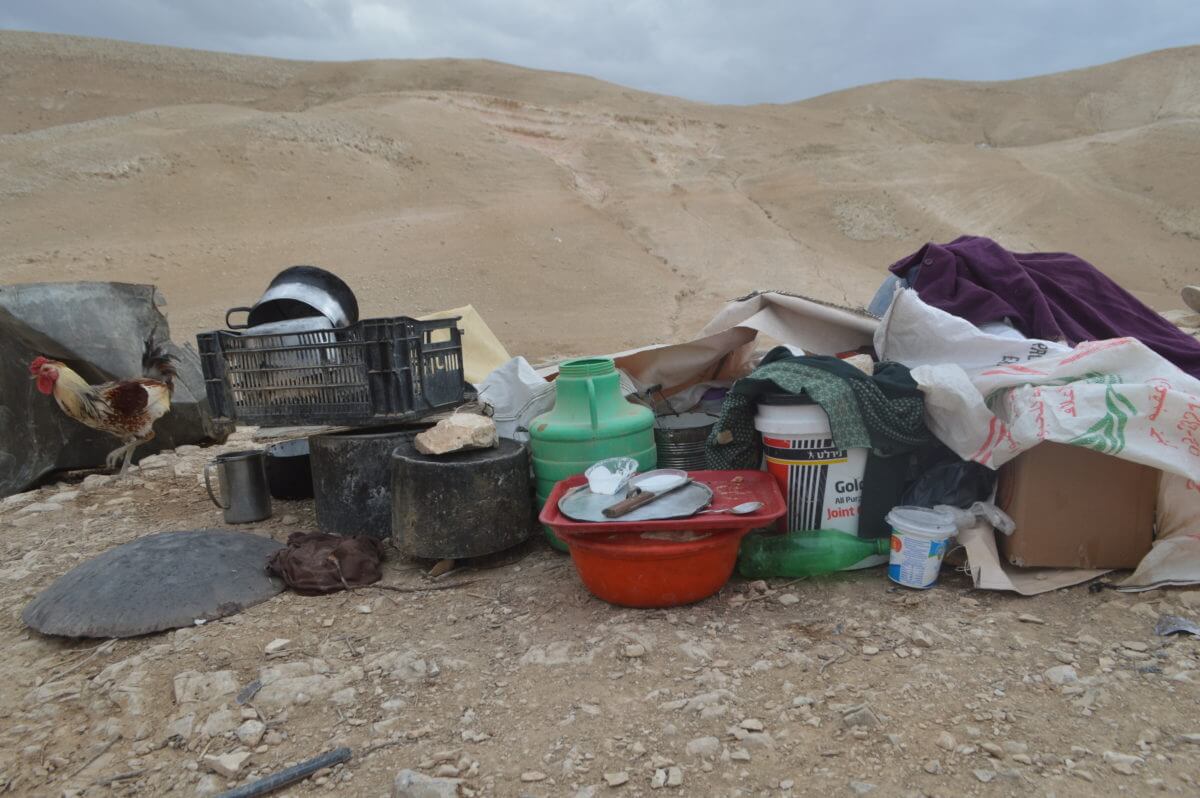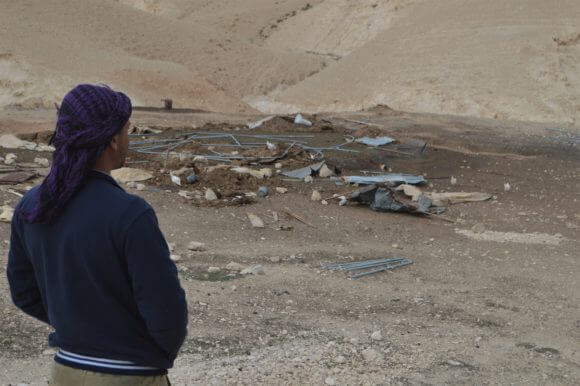A white tent is the only structure left standing among the scattered piles of twisted metal and tarp that was a Jahalin Tribe Bedouin encampment West of Jericho city in the Wadi Qilt valley.
On the morning of Wednesday, January 25th, Israeli forces escorted two bulldozers down from the main road up to the small Bedouin community. Mohammed Jahalin and his family were ordered out of their houses and forcefully gathered together on the edge of their encampment where they watched as the metal blades of bulldozers smashed through their homes.
Israeli forces destroyed every standing structure in the encampment — including three houses and two livestock barns — leaving 12 people homeless, half of whom are children.
In 2016, Israeli forces demolished homes, particularly Bedouin homes, in record numbers. According to United Nations documentation, Israeli forces in 2016 demolished or seized an unprecedented 1,093 Palestinian-owned structures throughout the West Bank, including East Jerusalem, resulting in the displacement of 1,601 Palestinians and affecting the livelihoods of another 7,101.
In the first 23 days of 2017, Israeli forces demolished 119 Palestinian-owned structures, leaving 177 Palestinians displaced. The bi-weekly average for home demolitions in 2017 is nearly a third higher than 2016’s, putting 2017 on track for another record-breaking year.

Mohammed Jahalin and his family are grateful for the tent that was donated by the Red Crescent Society the morning after the demolition — the dark clouds creeping in along the horizon warned of rain, and the family has no other option for shelter. The night before they slept outside in the open, with only piles of blankets and a campfire to keep warm during the cold desert night.
The encampment, nestled between rolling hills, is hidden out of sight, only accessible through a barely noticeable dirt path.
When Israeli forces showed up with bulldozers, Mohammed and his family had no previous notice, but they knew exactly what to expect, as this was not the first time their encampment has been razed to the ground

“What are we expected to do now?” he asked, dejectedly. “If someone destroys your house in front of your eyes, in front of your children, what would you do? What would be your reaction? Even though this has happened before, you can’t get used to something like this. You can’t get used to your home being destroyed in front of you.”
“Imagine that maybe you’re a brave person and you’re angry about what’s happening, but you can’t do anything about it because you don’t have any way to defend yourself or your family when you have soldiers in front of you with guns,” he said.
Mohammed said soldiers started with the barns, taking out only the animals before destroying the structures. Then they came for their homes.

“They took out the gas tanks from the kitchen, and left everything else inside when they destroyed the building,” Mohammed told Mondoweiss. A few feet away, their salvaged kitchen equipment was gathered together near a small fire where Mohammed’s mother made tea.
“When the soldiers came here, for me, I could keep it together, but the women and children, they were so upset. The children were crying — they didn’t understand what was happening — it’s an incredibly hard issue,” he said.
The Israeli government says the encampment is illegal, as it is on state-owned land, and technically in a closed military training zone. However the families who live there said they have never seen or heard any military training in the area, and that outside of the few times Israeli forces have come to demolish their encampment, they never encounter Israeli military at all.
Still, the Israeli government insists that families move and resettle within the city of Jericho, essentially leaving behind their Bedouin heritage and lifestyle. For Mohammed, moving to the city is out of the option — even if he were willing to resettle, he would have no idea where to start — the life he and his family live in the hills is the only life they have ever known.
Instead, he plans on rebuilding, as long as he can get the humanitarian aid he needs to do so. He and his family have been living in the same encampment for around 10 years, Mohammed explained, but originally the Jahalin Tribe hails from the Negev desert in what is now Israel.
The Jahalin’s were forced out of their traditional tribal territory, which ranges from 50km northeast of Bir Sheva to 30km west of the Dead Sea and 30km south of Hebron City, in 1949, a year after the creation of Israel, according to the Jahalin Solidarity group, a Palestinian non-profit that “aims to develop and work with Palestinian society targeted for transfer and forcible displacement.”
After 1949, the Jahalin Tribe fled their tribal territories to the edges of the Negev desert, where they were again displaced and forced into the West Bank and Jordan. In the early 1950s, many of the tribe applied for refugee status with the UNRWA.
Bedouin tribes, particularly those in the Negev, are one of the main groups targeted by Israeli forces for home demolitions. According to a report by the Association for Civil Rights in Israel (ACRI), “more than half of the approximately 160,000 Negev Bedouins reside in unrecognized villages, which the state refuses to provide with a planning structure and place under municipal jurisdiction.”
“The government uses a variety of measures to pressure Bedouins into relocating to government-planned urban centers that disregard their lifestyle and needs. Whole communities have been issued demolition orders; others are forced to continue living in unrecognized villages that are denied basic services and infrastructure, such as electricity and running water,” the report continued.
Looking out over the ruins of his home, Mohammed said he has no choice but to keep going the way he and his family always have, but he is scared for the next generation raised to know a way of life which is constantly under threat of being eradicated.
“They keep tearing down our homes, and it’s so expensive to rebuild,” he said. “But we don’t know what else to do, we are refugees, we don’t own land, we have nowhere else to go. Tell us where to go where we can continue our way of life and we can do that, but right now we have nowhere else to go, this is our home.”




The Nazis didn`t like gypsies either. Great National movements think alike?
https://www.theguardian.com/world/2004/nov/29/secondworldwar.biography
This is going to get exponentially worse at an ever faster clip. The yahoo and his grim band of zios know that the current monumental turmoil in the USA has created a nightmare/diversion come true for the zio vampires. USA’s attention in anything that may be happening outside its borders, and the “western civilisations” who have no clue how to handle this unfolding disaster or stand on their own two feet, have also forgot how to walk and chew gum at the same time, rather than take this opportunity to finally distance and reassert themselves away from the toxic partnership that has the horrendous potential to metastasize into the unthinkable.
Evil is at the white man’s door and is waiting to at last cut the arrogant once-powerful minority into an also-ran.
I lived in Israel about ten years ago: Fell in love with the beautifull country and lovely people I met. Then I started to see the other side of the truth. The love was not there for everyone. I visited Negev and West Bank last time 2009 and have not been able to return since then. I got physically ill of the discrimination and bullying of the palestinians and the bedoins and the fact that I couldn’t do anything about it.
I am so ashamed of the hypocritical politics of Europe, playing that eternal theather in U.N. , but never having the guts to boycott Israel for it’s behavior and actions towards the palestinians. (The collective guilt of happenings of 2nd WW has made many European countries blind for Israel’s actions).
We pretend to be a group of civilized nations respecting equality and human rights.. But still those rights do not seem to belong to everyone..
A while ago, I was assured by an unimpeachable authority that ethnic cleansing was “currently not necessary*”.
So either it has now become necessary again, or they are just doing this to keep in practice for when it does become necessary.
The main thing is (if I recall correctly) for us to hold our noses and primarily rejoice.
Have I left anything out, eljay?
(*Quoted from memory, so perhaps not accurate”.
On a recent trip to the Dead Sea, a Bedouin waiter told my wife that he had 38 brothers and sisters from his father and the father’s wives.
The Bedouin are not disappearing from the Negev.